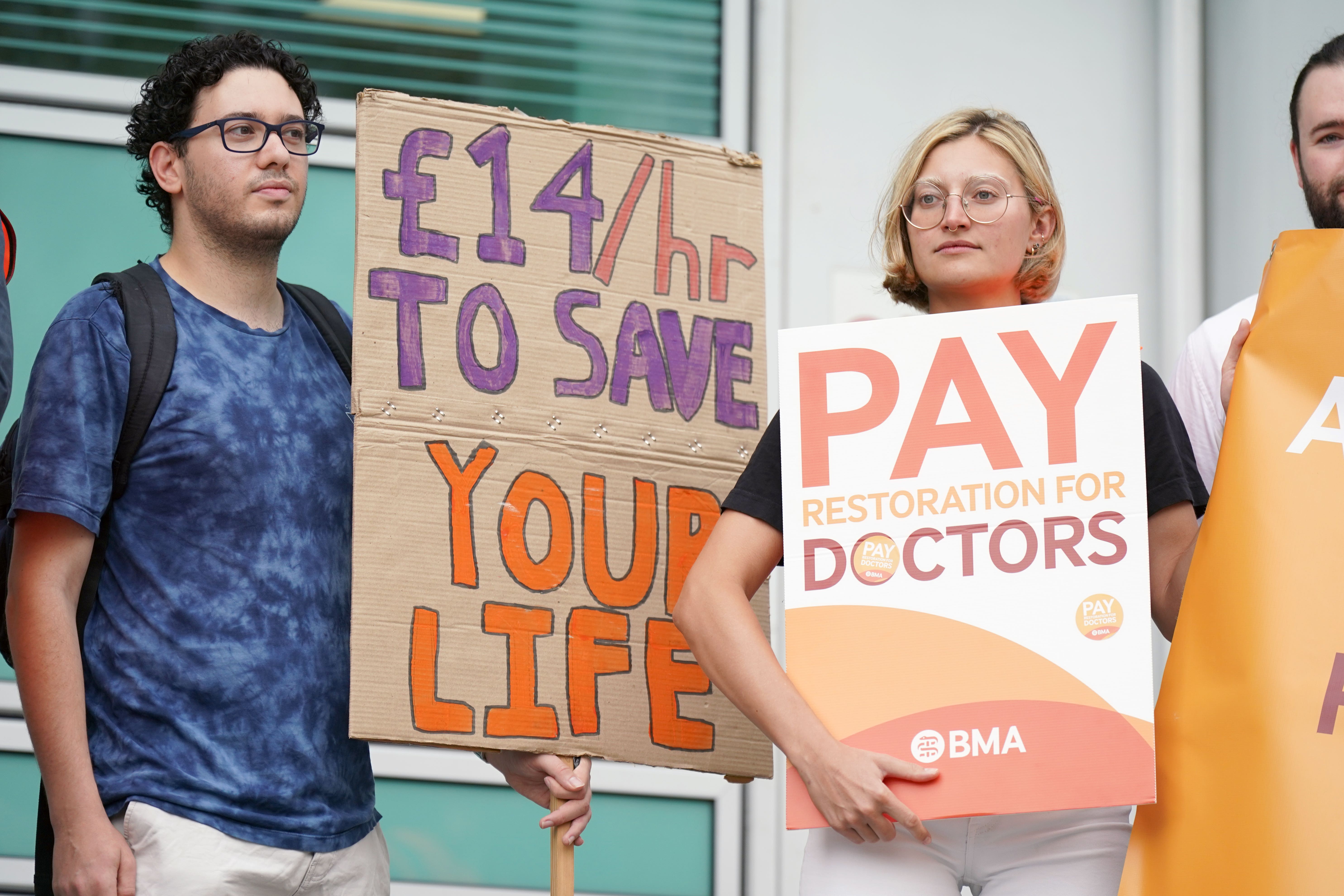Over 61,000 appointments affected by junior doctors’ strike as total cancellations may reach one million
The next strike to affect the NHS in England is due to begin on 24 August

Your support helps us to tell the story
From reproductive rights to climate change to Big Tech, The Independent is on the ground when the story is developing. Whether it's investigating the financials of Elon Musk's pro-Trump PAC or producing our latest documentary, 'The A Word', which shines a light on the American women fighting for reproductive rights, we know how important it is to parse out the facts from the messaging.
At such a critical moment in US history, we need reporters on the ground. Your donation allows us to keep sending journalists to speak to both sides of the story.
The Independent is trusted by Americans across the entire political spectrum. And unlike many other quality news outlets, we choose not to lock Americans out of our reporting and analysis with paywalls. We believe quality journalism should be available to everyone, paid for by those who can afford it.
Your support makes all the difference.More than 61,000 hospital appointments and procedures in England were rescheduled due to the latest strike by junior doctors, with the total number of cancellations so far likely to hit one million if the disruption continues.
Some 61,200 inpatient and outpatient appointments had to be rearranged as a result of the industrial action that took place from 11 to 15 August.
It was the fifth round of strikes in England since March by junior doctors from the British Medical Association (BMA), as part of a long-running dispute with the government over pay.
A further 635 cancellations in mental health, learning disability and community settings were also recorded, though this is likely to include a small amount of double-counting, according to NHS England which published the data.
Responding to the figures, NHS national medical director Professor Sir Stephen Powis said: “We will soon hit one million appointments rescheduled if strikes continue, which shows the enormous impact industrial action is having on patients, their families and the NHS.
“It’s difficult to overstate the scale of the disruption, as many services also avoid scheduling appointments for strike days meaning the true figure will be even higher.
“During almost nine months of action, our hard-working staff have done all they can to keep patients safe while tackling a record backlog, but there is no doubt this cumulative impact is posing a huge challenge for the health service.”
A separate 48-hour strike by BMA hospital consultants in England is due to begin at 7am on 24 August, while junior doctors are holding a fresh ballot to extend their legal right to take action.
The number of inpatient and outpatient hospital appointments cancelled in England since the current spell of industrial action began in the NHS in December 2022 now stands at 839,327.
If the community and mental health figures are included, the total rises to nearly 900,000 – though this will not reflect the overall number of actual cancellations, due to some duplication of data.
At the same time, not all NHS trusts have been able to supply figures for publication by NHS England, meaning it is impossible to reflect the true scale of disruption.
Health and Social Care Secretary Steve Barclay said: “Yet more appointments and procedures have now been postponed as a result of the latest BMA strike action.
“Not only has this action potentially harmed patients, but it has cost the NHS huge sums which could be spent on the frontline to help tackle waiting lists.
“As recommended by the independent pay review body, we are giving first-year doctors in training a 10.3 per cent uplift, and an average annual pay rise of 8.8 per cent worth between £3,000 and £4,700.
“My door is always open to discuss the other issues doctors face and I want to work together to improve their working lives, but this pay award is final so I urge the BMA to call an end to this needless disruption.”
Junior doctors belonging to the BMA in Scotland voted on Wednesday to accept a “record” pay offer from the Scottish government, which will see wages rise by 12.4 per cent in 2023-24 with further increases in line with inflation until at least 2026-27.
Scottish Health Secretary Michael Matheson said he was “very pleased that BMA members have overwhelmingly voted to accept this record pay deal for junior doctors”.
He added: “This is the single biggest investment in junior doctor pay since devolution, and maintains our commitment to make Scotland the best place in the UK for junior doctors to work and train.”


